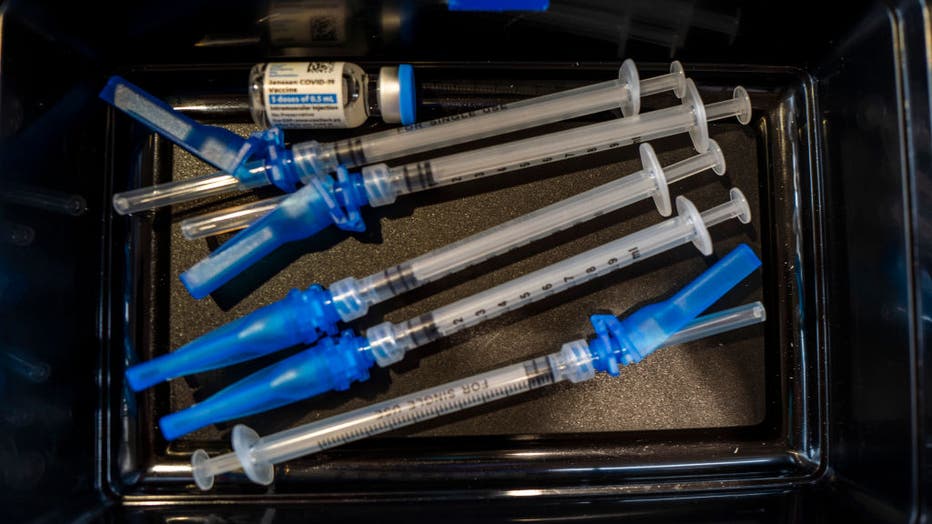J&J COVID-19 booster: FDA panel endorses extra dose at least 2 months later
WASHINGTON - A panel of outside advisers to the U.S. Food and Drug Administration on Friday voted to recommend a booster dose of the single-shot Johnson & Johnson COVID-19 vaccine at least two months later.
The committee voted unanimously 19-0 to recommend the J&J booster for individuals 18 and up at least two months after their primary vaccination. J&J has asked the FDA for flexibility with its booster, arguing the extra dose adds important protection as early as two months after initial vaccination -- but that it might work better if people wait until six months later.
The FDA panel endorsed the booster without setting a firm time. The advisers cited growing worry that recipients of J&J’s vaccination seem to be less protected than people who got two-dose Pfizer or Moderna options — and that most got that single-dose many months ago.
The FDA isn’t bound by the vote but its ultimate decision could help expand the nation’s booster campaign.
The government says all three U.S. vaccines continue to offer strong protection against hospitalization and death from COVID-19, and that the priority is getting first shots to the unvaccinated. But there’s a growing push to shore up protection against "breakthrough" infections and the extra-contagious delta variant of the coronavirus.
Booster doses of Pfizer’s vaccine began last month for people at high risk of COVID-19, and the same FDA panel on Thursday also voted to recommend a half-dose of Moderna’s COVID-19 booster for some Americans.
Mobile app users, click here to watch the meeting live.
J&J’s single-shot vaccine is made with a different technology than the two-shot Pfizer and Moderna vaccines, and it has consistently shown lower effectiveness levels.
On Friday, J&J executives pitched a booster as a way to strengthen a robust vaccine that they said has retained its protectiveness over eight months. But FDA scientists pointedly challenged that assertion.
"There are data that suggest the effectiveness of this vaccine is actually less robust than the company’s presentation here," said Dr. Peter Marks, FDA's top vaccines official. "And that is a finding of concern particularly because that’s been seen in minority communities potentially and others."
The panel's chair said regulators have a responsibility to shore up protection for J&J recipients.
"There is some urgency here to do something," said Dr. Arnold Monto of the University of Michigan.

FILE - The Department of Public Health and McDonald's California franchisees hold a pop-up vaccine clinic at McDonald's in Fullerton, California, on Sept. 27, 2021. (Francine Orr / Los Angeles Times via Getty Images)
A large study found that giving a second dose just two months after the first bumped that protection up to 94%. Giving that booster six months later instead prompted an even bigger jump in virus-fighting antibodies. But the company has tested a six-month booster in far fewer people.
"I’m not seeing the rationale for waiting" since a rapid second dose was so potent, FDA adviser Dr. Hayley Gans of Stanford University said Friday.
Timing flexibility is important because "there are perhaps some populations that might benefit more than others" from an extra dose sooner and others could wait, J&J’s Dr. Johan Van Hoof said.
But in their own review, FDA scientists also flagged a number of shortcomings with J&J's booster studies, including only a tiny portion of cases involving the delta variant, by far the dominant strain in the U.S.
Reviewers also warned that J&J had only followed booster recipients for a little more than a month after a second dose, making it hard to draw conclusions about the durability of protection. Finally, FDA staff emphasized that they had not had time to independently confirm J&J's findings, which were submitted shortly before the meeting.
FDA reviewers found no new safety concerns after a second J&J dose, but again, they cautioned about the small number of patients studied and the short follow-up period.
RELATED: J&J COVID-19 booster shot needs more evidence, FDA analysis suggests
Nearly 104 million Americans are fully vaccinated with Pfizer’s vaccine, CDC data shows (https://covid.cdc.gov/covid-data-tracker/#vaccinations_vacc-people-onedose-pop-12yr). Another 69 million are fully vaccinated with the Moderna shot, and some 15 million people received the J&J vaccine.
After the FDA advisers give their recommendations on boosters, the agency itself will make a decision on whether to authorize the Moderna and J&J boosters. Then next week, a panel convened by the U.S. Centers for Disease Control and Prevention will offer more specifics on who should get them. Its decision is subject to approval by the CDC director.
Following the vote, advisers also heard a National Institutes of Health study regarding the "mix and match" booster strategy.
Preliminary data from the NIH study, which was shared earlier this week and has yet to be peer-reviewed, found that people who initially got the J&J vaccine had better protection when they received Moderna or Pfizer’s booster — as opposed to another dose of the J&J shot.
"Persons who received an mRNA-based booster vaccination had a four-fold increase in their neutralization response more frequently than those who were boosted with (J&J)," the study authors wrote.
RELATED: Moderna COVID-19 boosters: FDA panel endorses lower-dose shots for seniors, high risk
This story was reported from Cincinnati. The Associated Press contributed.


